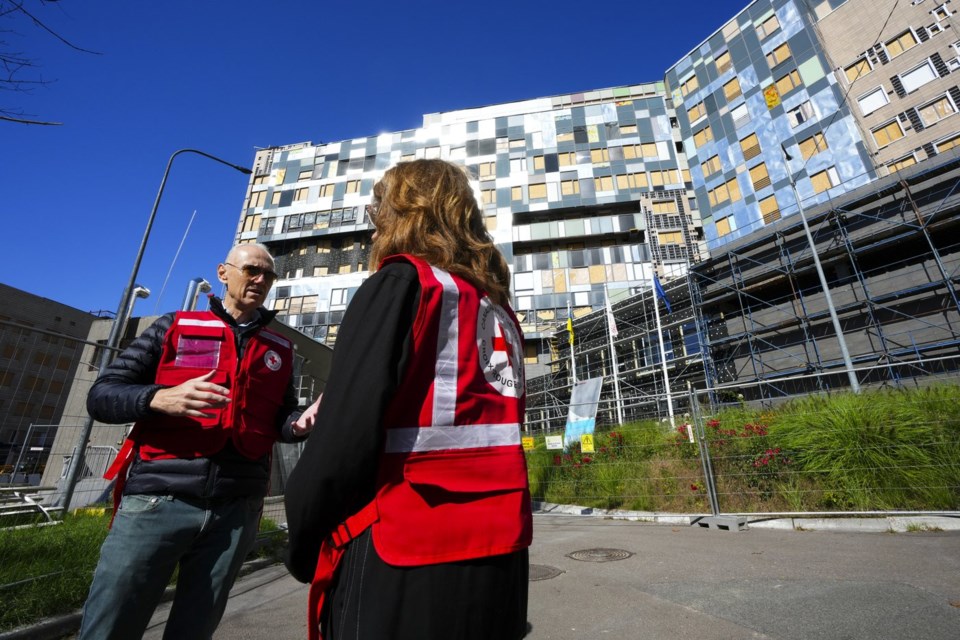KYIV — Workers dangle from ropes as they brush the last bit of white paint on the trim of the Okhmatdyt children’s cardiac hospital in Kyiv.
Below them, a damaged children's stroller and construction supplies sit atop a tree-covered garbage heap. Windows of some surrounding buildings are still boarded up with plywood.
One year after a devastating rocket attack on Ukraine's largest children's hospital that killed four and injured a dozen, the century-old facility is getting ready to reopen — with help from the Canadian Red Cross.
"The rocket actually fell to that building," said Mykyta Ilin from the Red Cross, pointing to a smaller building 100 metres away from the cardiac centre.
"Luckily, it hit this small building ... and not the main children's hospital or the cardio centre where the practical surgical operations were happening."
The hospital, a brick mustard-yellow building standing five storeys high, has been closed since the July 2024 rocket hit. It is designed to handle up to 18,000 children every year.
Four people died in the attack. The explosion blew out windows in the surrounding medical buildings. Three heart surgeries were underway when it happened. Children in hospital beds were showered with broken glass.
"I think every window got destroyed," Ilin said. "The windows were damaged, the facade was damaged. The roof was damaged a lot."
Medical equipment throughout the cardiac centre has been tightly covered with tarps. Fresh coats of paint have been applied, the roof fixed and operating rooms rebuilt.
"Our approach is not to build a new hospital," Ilin said. "The Red Cross approach is to repair how it was before, but make it a little better."
The building was built in 1894 as the Kyiv Free Cesarevych Mykola Hospital for Laborers and the Poor. About 20 years ago, it was given new life as the children's cardiac centre.
"It's the biggest children's hospital in Ukraine and the centre of cardiology and cardio surgery in all of Ukraine," said Sabina Voronetsa, health co-ordinator for the Canadian Red Cross in Kyiv.
After the blast, Voronetsa said, patients were transferred to a smaller facility nearby, but the reopening can't come fast enough. The list of people who need care is growing, she said.
She hopes Okhmatdyt will be reopened in one month's time.
The cost of the renovations is $1.4 million. The Canadian Red Cross has so far raised $500,000 through a special appeal.
Voronetsa said the rocket attack is having lasting effects on both the patients and staff.
"Children were inside, staff at the centre and hospital were doing their work and they were just caught in the middle of it," she said. "It's a hospital, and it's horrible and it's terrifying that any hospital anywhere could be attacked."
It was the first visit to the hospital for Robert Laprade, country representative for the Canadian Red Cross in Ukraine, who only took on the job a month ago.
The stories he's heard leave a deep cut, he said.
"Children were actually on the operating table and the destruction happened, and people were running around like crazy trying to save their lives," Laprade said.
"They've been able to pull it together."
This report by The Canadian Press was first published Aug. 27, 2025.
Bill Graveland, The Canadian Press



